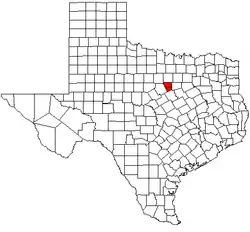Granbury micropolitan area
The Granbury micropolitan statistical area, as defined by the United States Census Bureau, was an area consisting of two counties in North Central Texas, anchored by the city of Granbury. In 2013, though, the Office of Management and Budget reclassified the area as a part of the Fort Worth-Arlington metropolititan division within the Dallas-Fort Worth-Arlington metropolitan area.

As of the 2000 census, the area had a population of 47,909 (a July 1, 2009, estimate placed the population at 59,493).[1]
Communities
- Incorporated places
- Census-designated places
- Unincorporated places
Demographics
As of the census[3] of 2000, 47,909 people, 18,614 households, and 13,939 families were residing within the area. Its racial makeup was 94.41% White, 0.32% African American, 0.81% Native American, 0.34% )|Asian or Pacific Islander]], 2.79% from other races, and 1.34% from two or more races. Hispanics or Latinos of any race were 8.12% of the population.
The median income for a household in the area was $41,536, and for a family was $48,285. Males had a median income of $35,563 versus $23,552 for females. The per capita income for the μSA was $20,314.
Major highways
Education
These school districts serve the Granbury micropolitan area:
- Bluff Dale ISD (mostly in Erath County)
- Glen Rose ISD
- Godley ISD (mostly in Johnson County, small portion in Tarrant County)
- Granbury ISD (small portion in Johnson, Parker counties)
- Lipan ISD (small portion in Erath, Palo Pinto, and Parker counties)
- Three Way ISD (mostly in Erath County)
- Tolar ISD
- Walnut Springs ISD (mostly in Bosque County)
References
- "Table 1. Annual Estimates of the Population of Metropolitan and Micropolitan Statistical Areas: April 1, 2000 to July 1, 2009 (CBSA-EST2009-01)". 2009 Population Estimates. United States Census Bureau, Population Division. 2010-03-23. Archived from the original (CSV) on March 26, 2010. Retrieved 2010-03-24.
- Thorp Wilkins, Barbara (Summer 1986). "High Hopes & Human Frailties". Granbury! (magazine). Hood County Texas Genealogical Society. Retrieved 2018-10-25.
- "U.S. Census website". United States Census Bureau. Retrieved 2008-01-31.